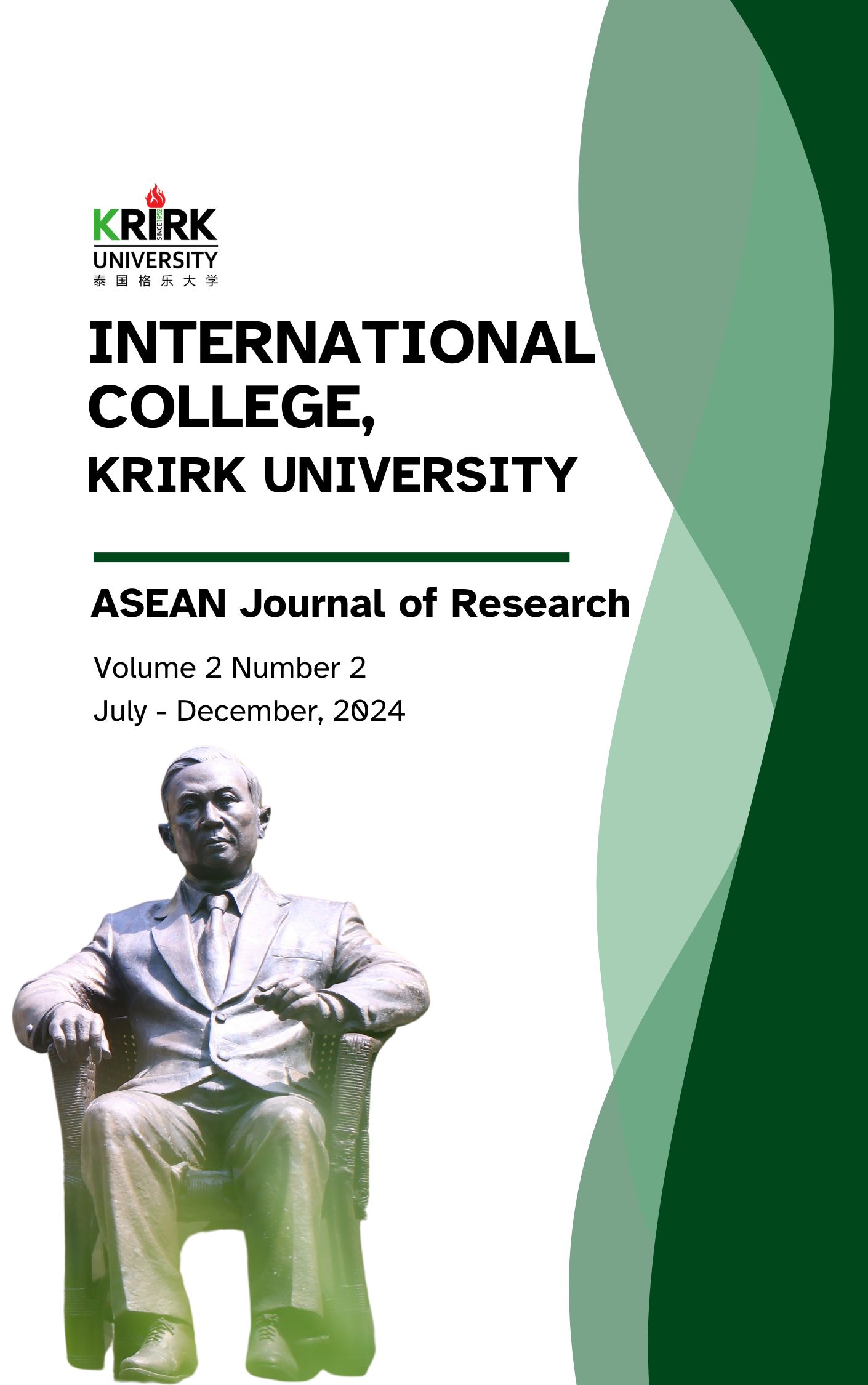Influence of Virtual Learning on Secondary School Students’ Academic Performance during the Pandemic in Nigeria
Abstract
bridging the barriers of distance and time. Learners in this case have the opportunity to learn curriculum-based contents remotely, which made teaching and learning activities possible during the pandemic era. However, learners in the developing world are still facing certain challenges around the implementation of such methods. Hence, this study investigated the influence of virtual learning on secondary school students’ academic performance during the pandemic era in Ilorin south by examining the virtual learning tool(s) that was utilized for learning during the pandemic; learners’ attitude and academic performance. 419 respondents participated in the descriptive study design while the data was being gathered. The results showed that Moodle and other virtual learning technologies were utilized for instruction. The academic performance of secondary school students was positively impacted by virtual learning environments. The study came to the conclusion that virtual learning could encourage educational institutions to adopt a 21st-century curriculum. When virtual learning is incorporated into the classroom, gender has no discernible impact on students' academic achievement. Given that virtual learning platforms help students overcome time and distance limitations, it was suggested that school pupils receive training in their use.
References
Abidoye, J.A. and Omotunde (2015). Effects of Computer Animation Package on Senior Secondary School Students’ Academic Achievement in Geography in Ondo State, Nigeria. Journal of Teaching and Teacher Education, 3(2), 123-7. DOI: 10.12785/jtte/030202.
Basilaia, G. & Kvavadze, D. (2020). Transition to online education in schools during a SARS-CoV-2 coronavirus (COVID-19) pandemic in Georgia. Pedagogical Research, 5(4).
Blurton, C. (1999). New directions of ICT-use in education. United National Education Science and Culture Organization, available at: https://unesdoc.unesco.org/ark:/48223/pf0000119191.
Chick, R. C. (2020). Using technology to maintain the education of residents during the COVID-19 pandemic, Journal of Surgical Education, 77, 729-732.
Cucinotta, D. & Vanelli, M. (2020). WHO declares COVID-19 a pandemic. Acta Biomedica : Atenei Parmensis, 91(1), 157-60, available at: https://doi.org/10.23750/ABM.V91I1.9397.
Di Pietro, G., Biagi F., Dinis Mota da Costa, P., Karpinski, Z. & Mazza, J. (2020). The likely impact of COVID-19 on education reflections based on the existing literature and recent international datasets. Luxembourg: Publications Office of the European Union.
Huber, S.G. & Helm, C. (2020). COVID-19 and schooling: evaluation, assessment and accountability in times of crises - reacting quickly to explore key issues for policy, practice and research with the school barometer. Educational Assessment, Evaluation and Accountability, 32, 237–270 (2020). DOI: https://doi.org/10.1007/s11092-020-09322-y
Kop, R. & Hill, A. (2008). Connectivism: Learning theory of the future or vestige of the past? The International Review of Research in Open and Distributed Learning, 9(3). DOI: 10.19173/irrodl.v913.523.
Maru, G.N. (2020). Applying video for writing descriptive text in senior high school in the Covid-19 pandemic transition. International Journal of Language Education, 4, 2548–8465. DOI: https://doi.org/10.26858/ijole.v4i3.14901
Mishra, L., Gupta, T. & Shree, A. (2020). Online teaching-learning in higher education during lockdown period of COVID-19 pandemic. International Journal of Education Research Open, 1, 100012. DOI: https://doi.org/j.ijedro.2020.100012.
Monroy Gardia, F.A., Llamas-Salguero, F., Fernández-Sanchez, M., & Carrión del Campo, J.L. (2020). Digital technologies at the pre-university and university levels, Sustainability, 12(24), 10426. DOI: https://doi.org/10.3390/su122410426.
O’Hagan, C. (2020). Startling digital divides in distance learning emerge. UNESCO, available at: https://www.unesco.org/en/articles/startling-digital-divides-distance-learning-emerge.
Rondonuwu, O.G. (2022). Students' perception in English teaching and learning concerning native-speakerism. Journal of Teaching English, Linguistics, and Literature, 1(2), 175–195. DOI: https://doi.org/10.2801/JOTELL.V1I2.3345.
Sahu, P. (2020). Closure of universities due to coronavirus disease 2019 (COVID-19): Impact on education and mental health of students and academic staff. Cureus, 12(4), e7541. DOI: 10.7759/cureus.7541.
Sun, L.T., Tang, Y. & Zuo, W. (2020). Coronavirus pushes education online. Nature Materials, 19, 687.
Surkhali, B. & Garbuja, K. (2020). Virtual learning during COVID-19 pandemic: Pros and cons. Journal of Lumbini Medical College, 8(1), 19–20.
Tiruneh, D.T. (2020). COVID-19 School Closures May Further Widen the Inequality Gaps between the Advantaged and the Disadvantaged in Ethiopia, UKFIET, available at: https://www.ukfiet.org/2020/covid-19-school-closures-may-further-widen-the-inequality-gaps-between-the-advantaged-and-the-disadvantaged-in-ethiopia/.
Tzifopoulos, M. (2020). In the shadow of coronavirus: Distance education and digital literacy skills in Greece. International Journal of Social Science and Technology, 5, 1-14.
Wu, Z. (2020, May). How a top Chinese university is responding to coronavirus. World Economic Forum, available at: https://www.weforum.org/agenda/2020/03/coronavirus-china-the-challenges-of-online-learning-for-universities/.
Zhang, X. (2020). Thoughts on large-scale long-distance web-based teaching in colleges and universities under novel coronavirus pneumonia epidemic: A case of Chengdu University. International Conference on Culture, Education and Economic Development of Modern Society (pp. 1222-1225). Amsterdam: Atlantis Press.
Zhu, X.D. &Liu, J. (2020). Education in and after COVID-19: Immediate responses and long-term visions, Postdigital Science and Education, 1-5. DOI: https:/doi.org/10.1007/s42438-020-00126-3.
Zitter, I., de Bruijn, E., Simons, R.J. & ten Cate, O. (2011). The role of professional objects in technology-enhanced learning environments in higher education. Interactive Learning Environments, 20(2), 119-40. DOI: 10.1080/10494821003790863.
Downloads
Published
How to Cite
Issue
Section
License
Copyright (c) 2024 ASEAN Journal of Research

This work is licensed under a Creative Commons Attribution-NonCommercial-NoDerivatives 4.0 International License.
The Copyright belongs to the ASEAN Journal of Research




